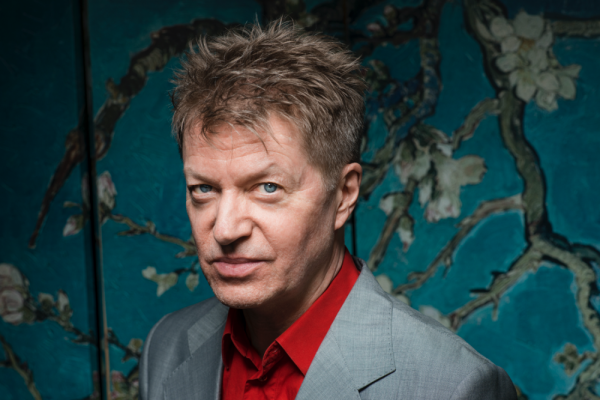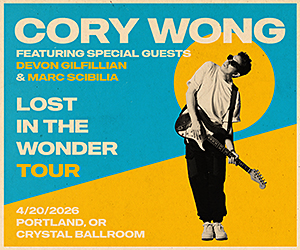Home > Jazz / Blues
01/21/2019
Nels Cline Q&A: From Improvising with his brother to his latest working band - Nels Cline 4
By LISA HELFER // Guitarist/composer Nels Cline talks about his latest album and beyond Wilco. The Nels Cline 4 will play two shows at Mississippi Studios on February 14, 2019. The first show is sold out, but tickets are available for the late show (21+).
Nels Cline emerged in the late 1980s with an unrelenting musical genius that has morphed and reconfigured a thousand times over. Widely known as the lead guitarist for Wilco, Cline has collaborated with the likes of Mike Watt, Ricki Lee Jones, Thurston Moore, Lee Ranaldo, Yuka Honda, Zeena Parkins, William Parker, Elliot Sharp, Wadada Leo Smith, The Geraldine Fibbers, Firehose, Carla Bozulich, and Vinny Golia.
Cline’s illustrious solo career includes albums with the Nels Cline Trio, Nels Cline Singers, and Quartet Music. His most recent two-guitar duo with Julian Lage, documented on the 2014 album Room ranks among the most special for many. Lage, for his part, declared he had "found his people" playing with Cline. The duo is still ongoing but transformed into The Nels Cline 4. The group’s debut album, Currents, Constellations, is Cline’s second Blue Note release. It consists of Cline and Lage plus the uber-powerful rhythm section of bassist Scott Colley and drummer Tom Rainey. All of the music is Cline's, except for a rare Carla Bley gem, “Temporarily” from the Jimmy Giuffre 3 songbook.
Named one of Rolling Stone's "100 Greatest Guitarists," Cline is coming off the success of his 2016 Blue Note debut Lovers, a "quietly ravishing double-album" (New York Times) featuring Cline with a large ensemble conducted and arranged by Michael Leonhart that was "wildly inventive in its water-colored way" (Rolling Stone). On Currents, Constellations, Cline embraces a sparser but edgier instrumentation. Each track on the album represents the quartet’s capacity for an immensely raw and beautiful musical conversation.
You started playing music at 12 with your twin brother, Alex and the two of you continued to play together well into your 30s. You’ve discussed how that evolution in your music created a great freedom for the two of you to then forage into different genres including rock, punk, country, jazz, and improv. Improv is a big deal in your work throughout. Do you think these early years seeded this for you?
Absolutely. Our process together really set the foundation for a lot of what was to come. In my brother’s case, after about 1971, he stopped following the rock and roll path, but I continued. I think it was about my personality, it just persisted in me. From the beginning, Alex and I were interested in instrumentals, long forms, jams, and extended composition way before we even knew we were improvising. Composing original material was key for us, I don’t know if we really knew we were improvising, it may have just been inherent in who we were.
Extemporaneous expression is exciting and fresh and new at its best and that’s what we were all about. A friend of ours from high school also turned us on to his collection of import albums. We were inspired by Jan Garbarek and Afric Pepperbird and other artists on the ECM Label. He also introduced us to Incus Records and Derek Bailey’s music. Fred Frith was another great one, his guitar solos really got our imagination going. In fact, Massacre was an incredibly important band for me, I had the opportunity to see them live in the early 80s and it was a very powerful experience. We were also inspired by John Coltrane, Miles Davis, Eric Dolphy, the Art Ensemble of Chicago, and jazz rock and fusion, such as the Weather Report, Oregon, Herbie Hancock, and Tony Williams. I became increasingly interested in these types of music.
In the Nels Cline 4, you’ve added a rhythm section and expanded the original work you did with Julian Lage. Some of the focus was to create non-soloistic guitar interaction, to bring the rhythm section up. Can you talk about the inspiration for this group a bit?
I think Julian and I wanted to see what it would be like to add a rhythm section to the excursions of our duo which has a marvelous chemistry unto itself. I have to say, Julian is really one of the best guitar players ever and I really enjoy working with him. We don’t really find soloing to be the following of the focal point of our compositions – it’s really more about conversation and exchange. You will find some solos in our songs, but personally, as a guitar player, no matter how virtuosic, I find it tiring to hear someone solo and wail…that is…until I hear Julian solo! We took our duo thing and added bass and drums to it for the Nels Cline 4. Julian and I had talked about doing this from the beginning of our playing together and while we were producing Room.
For your latest album, Current, Constellations, I read that you wrote bits of material connected and that you cue things on the album with numbers and hand signals.
Yes, I do cue that way, and it works very well. I have used hand signals in “Furtive”, which has since found its own more predictable form, but initially, I wrote lines for Julian and me. I hold up one, two or three fingers and we take it from there. Also, in “River Mouth, Part Two” we used hand signals, but it has also found a more settled form since we began playing it.
Ok, last improv-related question, I promise! What is “good improv” and who are today’s innovators in your opinion?
I’m really not sure about innovators in improv as a category, so many of today’s great improv musicians have evolved in my opinion from the traditions of the 70s and before. However, players like Evan Parker, Anthony Braxton, Derek Bailey, Wadada Leo Smith are truly great improvisors. I feel they have an awareness of the tradition of so-called jazz—meaning they negotiate harmonic changes of a song with a vocabulary or syntax we typically associate with jazz or jazz improv. However, there are many great musicians who do not come from a jazz background and are incredible improvisers. Zeena Parkins, who I frequently collaborate with, is a wonderful example of this—she is a master musician who applies classical technique to harp playing. She has deeply investigated other methods of music I would call electronic alteration and to a very high degree. Zeena has gone way beyond the traditional language of the harp. The results are not merely novel, but absolutely startling in the best way.
I consider what I do to be more emotionally based; I go for feelings, rather than conception.
Good improv for me really boils down to an awareness of specific pitches you hear while playing and deeply listening. It means the person or people you are playing with are hearing you, really hearing you and responding with their own aesthetic or vocabulary and redefining the so-called parameters. The effect is somewhat transporting, especially when the level of communication is very high and when this happens, most of the time for me, there is not much happening in terms of effort—this can be really exhilarating, because it is based on pure connection and communication.
Your guitar tones and sounds are utterly encyclopedic. How do you arrive at these places? What is your favorite pedal?
A lot of it is really intuitive and the malleability of the electric guitar is certainly a huge aspect. My application of it and what you might call my “Catholic taste” also comes into play. I don’t think I have a musical personality per se, but whether I’m creating an arid sonic landscape, or something else, imagination is the most importation thing to sound creation. The work is really about becoming involved in a music instrument and figuring out how to manifest the sounds and make them real.
I don’t use pedals or effects in a few of my groups, and I don’t use them with Julian or in the Nels Cline 4, but when I do, it is in a timbre, linear way, because I can use them to make specific sounds. It’s not very experimental actually, because I have arrived at methodologies with various effects pedals, but it doesn’t always mean I play the same thing.
There are a lot of sounds I like that are pleasing to me, but not other people. I find them absorbing and I like, for example, to be able to detune a guitar and loop sounds in reverse and change the pitch microtonally. I arrive at these landscapes via a little apparatus which lets me do exactly that. So, it is more technical rather than wizardry!
My favorite pedal is called the Electro Harmonics 16-second Digital Delay—I have 6 of them and only one works. I need to find someone who can take them apart and make them work again!
I also really like a good volume pedal.
Is there a particular track you feel that is representative of something you’ve created on guitar where you are like, wow, I really innovated here…surprised myself?
Wow, I don’t know, I mean it depends—in terms of pristineness, something like, “Fressia/The Bond” would reach that for me.
If I wanted to say something about achieving a particular guitar sound in a more electronically altered sense, I would say, a track from The Nels Cline Singers record The Giant Pin, called, “He Still Carries a Torch for Her” where there is a lot of live looping was really an interesting piece. It is unnecessarily long in retrospect, I’m using the Electro Harmonics 16-second Digital Delay and creating the loops on the fly. It’s pretty funny, because later on, I usually cringe at all of my solos.
Can we expect other albums from the Nels Cline 4?
I think Julian and I will do another album together soon. I’ve also been playing with Tom Reedy and Chris Lightcap a lot and we may record something soon. I will also start a new Nels Cline Singers record and include eight players and special guests.
The Nels Cline 4 will play two shows at Mississippi Studios on February 14, 2019. The first show is sold out, but tickets are available for the late show (21+).
https://www.mississippistudios.com







